17 Dec 2010
‘Confronting Change’ at London’s South Bank Centre
 A fantastic evening last night at the South Bank Centre in London, organised by Transition Finsbury Park. The event was a sell-out, and proved to be an inspirational coming together of London Transition initiatives, under the title “Confronting Change”. Polly Higgins, a barrister and author of ‘Eradicating Ecocide’ was the host and got the evening underway. She had recently returned from the COP16 negotiations at Cancun, and talked about what had happened there.
A fantastic evening last night at the South Bank Centre in London, organised by Transition Finsbury Park. The event was a sell-out, and proved to be an inspirational coming together of London Transition initiatives, under the title “Confronting Change”. Polly Higgins, a barrister and author of ‘Eradicating Ecocide’ was the host and got the evening underway. She had recently returned from the COP16 negotiations at Cancun, and talked about what had happened there.
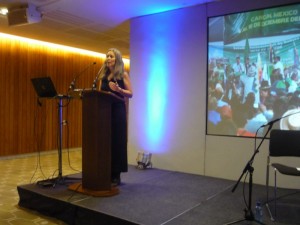 Although some in the media have hailed what emerged as a result, in reality, Polly said, expectations had been driven so low in the time since Copenhagen, that for anything to come out of it would be seen as a success. One of the worst things to come out of it was the REDD+, which advocates the co-option of forests, regardless of the rights of the people who inhabit them. At Cancun, there were protests and actions mostly comprised of indigenous peoples who were campaigning for Earth rights, which are not being considered in the present negotiations.
Although some in the media have hailed what emerged as a result, in reality, Polly said, expectations had been driven so low in the time since Copenhagen, that for anything to come out of it would be seen as a success. One of the worst things to come out of it was the REDD+, which advocates the co-option of forests, regardless of the rights of the people who inhabit them. At Cancun, there were protests and actions mostly comprised of indigenous peoples who were campaigning for Earth rights, which are not being considered in the present negotiations.
Evo Morales, the President of Bolivia, the world’s only indigenous President, was the only world leader to speak out against the agreement. He attended a large public forum with no obvious security (although as Polly pointed out in her photo of the event, what she initially assumed were ‘choirboys’ on the side of the stage were in fact his bodyguards!). He was also the only world leader who went out of the venue and spoke to the people. Each country can send between 5 and 500 negotiators, and the event is also awash with lobbyists. The agreement that emerged commits the world to a 4.5-6°C rise in temperature.
She then talked about the similarities between climate change and slavery. Wilberforce, one of the key British figures in the abolition of slavery, talked about the need to go ‘upstream’ and to ‘turn off the taps’ of supply. He saw the need to make slavery criminal, to pull the subsidies that supported it, to give new subsidies to the alternatives. At that time, 300 corporations argued that abolition would lead to economic collapse, the same thing we are now hearing from the 3,000 leading corporations. At that time, industry proposed limiting numbers of slaves (a cap), allowing market forces to drive change (trade), the use of tradable permits, self regulation, with fines imposed only if limits are exceeded, and improving conditions. These are the same arguments we are seeing now against climate change legislation.
It is Polly’s proposal, and the thrust of her work, that ecocide becomes a crime, in the same way that genocide did after World War 2. At the moment, laws aren’t fit for purpose. Imagine, she told the audience, that she were the CEO of a large corporation and that you are my directors. A law outlawing ecocide has just been passed. Both you and I are now at risk of being jailed if our operations have a damaging impact on the environment. The banks will no longer fund what has become criminal activity, and governments will no longer encourage criminal activities. We need, she concluded, to see the planet as a living system with intrinsic value, and that we have a responsibility to not destroy it, and the law is a vital vehicle for achieving that.
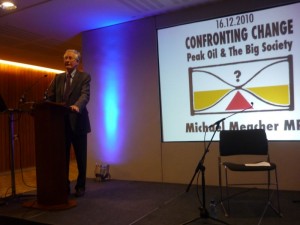 The next speaker was Michael Meacher MP. There is no question, he began, that we are on a path that could lead, within 2-300 years, to the next great extinction, only we will be the first extinction that could have done something about it. Since the arguments are irrefutable, he asked, why is it that we don’t do anything about it? One of the key things, he suggested, is the self-interest of the powerful. Peak oil means that the scale of change over the next few decades could be apolocalyptic. He stressed the importance of oil for farming, industry, transportation and military capability, the principle area, he suggested, where no oil would be a good thing.
The next speaker was Michael Meacher MP. There is no question, he began, that we are on a path that could lead, within 2-300 years, to the next great extinction, only we will be the first extinction that could have done something about it. Since the arguments are irrefutable, he asked, why is it that we don’t do anything about it? One of the key things, he suggested, is the self-interest of the powerful. Peak oil means that the scale of change over the next few decades could be apolocalyptic. He stressed the importance of oil for farming, industry, transportation and military capability, the principle area, he suggested, where no oil would be a good thing.
The best estimates, he told the audience, are that we are about half way through the world’s total supply. While supply is fixed, demand is growing in India and China. What will force the world to change, and to break its dependency? Will it be price, currently pushing $90 a barrel? If we hadn’t had the crash of 2008-2009 it would be higher, he said.
There is virtually no chance of the world voluntarily limiting oil consumption. Everyone knows what we need to do, but the vested interests of coal, oil and gas are so strong and governments are so week that no-one will move until forced. Our best hope, he argued, is for a shift to a transitional economy, which as someone long opposed to nuclear power, would be powered by natural gas. We also need a higher carbon price, and a huge programme of energy conservation, present-day waste is prodigious. We have huge potential for renewable energy, a fantastic wind resource, yet we generate less renewable energy than most other European countries.
We cannot, he concluded, rely on governments, they are feeble, both collectively and individually. Our only hope is the mobilisation of common sense. “I think”, he concluded, “that the Transition movement is one of the most optimistic options that I, as a politician, have yet seen and can look forward to”.
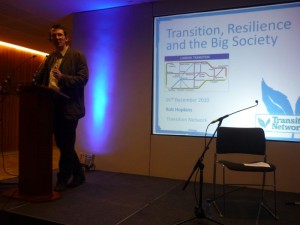 Then there was a short break, and then I spoke. I talked about how Transition initiatives viewed peak oil and climate changes as opportunities, and stressed that it is about moving towards something rather than away from it. I talked about Sharon Astyk’s ‘Theory of Anyway’ which argues that even if peak oil and climate change turned out not to be the case, we would still be doing what Transition initiatives are doing because, ultimately, it is more life affirming, more connecting, more enriching and nourishing than how things are done today. I gave some insights into what Transition is and what people are doing across the country, and then spoke a bit about the Big Society, arguing that it offers, in theory, much of what Transition is arguing for, but it has significant weaknesses as an idea:
Then there was a short break, and then I spoke. I talked about how Transition initiatives viewed peak oil and climate changes as opportunities, and stressed that it is about moving towards something rather than away from it. I talked about Sharon Astyk’s ‘Theory of Anyway’ which argues that even if peak oil and climate change turned out not to be the case, we would still be doing what Transition initiatives are doing because, ultimately, it is more life affirming, more connecting, more enriching and nourishing than how things are done today. I gave some insights into what Transition is and what people are doing across the country, and then spoke a bit about the Big Society, arguing that it offers, in theory, much of what Transition is arguing for, but it has significant weaknesses as an idea:
- It views business as entirely benign
- It is based on the concept of making government smaller at the very time when that is the last thing we need
- It has no foundations of social justice
- It does not draw from the experience of NGOs who have been doing this stuff for years
- It has no compelling narrative
How would it be, I suggested, if that narrative were a Transition one, that the intention were, by 2014 to have put in place:
- 2000 new urban market gardens, on land permanently excluded from future development, running as commercial enterprises but also with a training component
- 500 new ‘Food Hubs’, making local food available to poorer communities at cheaper-than-supermarket’ prices, modelled on Stroud’s ‘Stroudco’ food hub. These would be community-owned social enterprises
- 40,000 people trained in domestic retrofitting and energy efficiency, with a larger target of retrofitting every UK property by 2020
- 1 million fruit or nut bearing trees to be planted in, or around, our towns and cities, akin to the Millennium Forest project, but this time based on productive plantings
- 3,000 self-build schemes to be underway which use 80% local materials as a way of stimulating and creating a local economy around the production and processing of local building materials.
I then talked about where Transition goes next, that it is about promoting a culture of social enterprise and entrepreneurship, about promoting the community ownership of assets, supporting communities to become their own banks, energy companies, developers and so on.
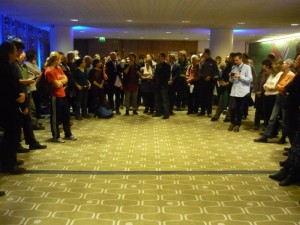 There was then a session where the chairs were moved out of the way and people stood on a circle and people from different London Transition initiatives talked about what they are doing (apologies, I didn’t take notes here, so I am doing this from memory…). Transition Tooting spoke of the Trashcatchers Carnival, which has now been picked up on by 3 cities in Australia who are planning to do their own versions next year.
There was then a session where the chairs were moved out of the way and people stood on a circle and people from different London Transition initiatives talked about what they are doing (apologies, I didn’t take notes here, so I am doing this from memory…). Transition Tooting spoke of the Trashcatchers Carnival, which has now been picked up on by 3 cities in Australia who are planning to do their own versions next year.
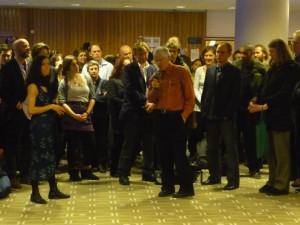 Transition Brixton talked about a range of social enterprises that are emerging, including a bicycle delivery service, of the work they are doing around local food, and the Brixton Pound. Transition Finsbury Park talked of a wide range of projects they are doing, including working with local kids. About 10 groups spoke, offering a fascinating insight into the diversity of what is emerging in the capital. Azul Thome from the Food from the Sky initiative in Crouch End, which has created a food garden on the roof of the local Budgens supermarket, spoke movingly about the project and how it is creating some deep and fascinating diverse engagement around food.
Transition Brixton talked about a range of social enterprises that are emerging, including a bicycle delivery service, of the work they are doing around local food, and the Brixton Pound. Transition Finsbury Park talked of a wide range of projects they are doing, including working with local kids. About 10 groups spoke, offering a fascinating insight into the diversity of what is emerging in the capital. Azul Thome from the Food from the Sky initiative in Crouch End, which has created a food garden on the roof of the local Budgens supermarket, spoke movingly about the project and how it is creating some deep and fascinating diverse engagement around food.
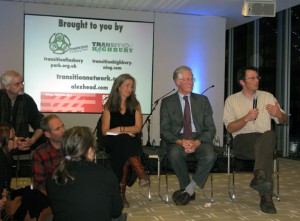 Then there was a fascinating Q&A session which explored a range of subjects. There were a number of staff present from Lambeth Borough Council who have been working very closely with Transition Town Brixton, their local Transition initiative, and asked what more they can do, which led to some very interesting discussions. There were questions about the role of politics, about diversity and inclusion and many other things. I was sat next to Michael Meacher, and as the different groups talked about what they are doing, he kept turning to me and saying “wow”… he was very impressed and inspired by the energy that was in the room. As we were leaving he said “what percentage of the room do you think said things tonight? 30%? I can’t remember when I have been to a public meeting with that kind of engagement”. The whole event was very inspiring, very insightful, and a remarkable insight into what Transition looks like in the urban context. Congratulations to the organisers for putting on such a great evening…
Then there was a fascinating Q&A session which explored a range of subjects. There were a number of staff present from Lambeth Borough Council who have been working very closely with Transition Town Brixton, their local Transition initiative, and asked what more they can do, which led to some very interesting discussions. There were questions about the role of politics, about diversity and inclusion and many other things. I was sat next to Michael Meacher, and as the different groups talked about what they are doing, he kept turning to me and saying “wow”… he was very impressed and inspired by the energy that was in the room. As we were leaving he said “what percentage of the room do you think said things tonight? 30%? I can’t remember when I have been to a public meeting with that kind of engagement”. The whole event was very inspiring, very insightful, and a remarkable insight into what Transition looks like in the urban context. Congratulations to the organisers for putting on such a great evening…
James Samuel
17 Dec 8:14pm
Inspiration in abundance again – thank you Rob!
I found myself looking at the logo for the event for quite a long time. It combines so many great symbols for the moment. A peak oil curve, a funnel from The Natural Step, a road and a question mark allowing for possibilities, as we move through an hour glass of time into the unknown.
Jo Homan
20 Dec 11:25am
The artist, Alex Head, originally used this in a project for a new flag in Lanzarote – http://alexroberthead.blogspot.com/2010/06/pause-listen-and-continue-haria.html I always found it fascinating for the symbolism James mentions and was astonished they agreed to such a radical flag. In the original context the triangle was the volcano. I am not sure whether the question mark is necessary because the bright red triangle as fulcrum or pointing to the distant horizon is questioning in itself. It makes me think the future is ‘hanging in the balance’.
Anyway, I am glad Alex was persuaded to adapt the design for this event and I hope it can be adapted again – it’s so powerful.
And what an event! We’re still recovering.
Diana Marquand
20 Dec 8:05pm
I have read an account of what has been said, by Polly Higgins, Michale Meacher and by the Transition groups. This sounds like a fantastic event and spells out the way we should be going. Bugt I entirely agree that we need internationally binding laws to save this planet otherwise the multinational agencies will continue with “business as usual”. I am a member of Friends of the Earth. I suggest that events similar to the one in London should be put on across the UK (and please come to South Wales where I live) and i suggest that gthe Stop Climate Chaos group is asked to take up the idea of ecocide with utmost urgency and to campaign in the UK parliament that this is recognised. (FOE is a campaigning group and so are some of the other Stop Climate Chaos groups, many have good lobbying powers and skills. Please make sure that this turns into a massive movement for change, go to all Universities and schools and spread the message, tell me how i can help – I’m pretty good at public speaking and putting on events. Thank you for doing this!
Diana Marquand
20 Dec 8:09pm
I have tried to submit a comment,don’t know if i was successful I said let us form a mass lobbying movement to get – firstly the UK government to adopt ecocide. Contact all the Stop Climate Chaos lobby gvroups such as Friends of the Earth, Greenpeace, Oxfam. I am currently campaigning in Wales. Please tell me how I can help. I am quite good at public speaking and at putting on events.
Mark
21 Dec 1:15am
Oh dear. Oh deary, deary dear.
‘Ecocide’, deary, deary me.
Polly seems to be just another North London eco-warrior living in the product of 100s of years of environmental pollution that is known as London. Must be real easy to call for seismic shifts in attitudes when you have clean water, good sanitation, a massively subsidised public transport network and Waitrose is only 100 yards away.
Try living off-grid in a mud hut eschewing all the trappings of modern industrial society like birth-control and heating and then I might listen to anything you spout on this subject.
Mr Meacher seems to know even less actual science than Polly. The science is far from settled as even the IPCC reports make very clear. When dealing with a non-closed near-chaotic system with multiple unknown feedbacks and a possibility for near-term and long-term exponential changes (not to mention similar uncertainties with the Sun and the rest of the Universe) only an arrogant fool would declare a linear causal relationship between a minor atmospheric component such as CO2 and such a laughably vague measurement as a ‘global average temperature.
Given the current rate of increase in our planetary usage we do not have 300 years worth of oil left to burn.
Similar constraints mean that we do not have sufficient mineral capacity to build all the pv solar panels and batteries needed to run a replacement transport infrastructure.
Lastly we do not even have the economic capital to properly retrofit our electricity distribution grid.
Worrying about climate change is a complete waste of time that could otherwise be employed in working out how to stop us sliding back to a subsistence agrarian society as our ability to economically generate electricity fails one power station at a time.
Diana Marquand
12 Jan 12:23am
Many Transition groups believe that they cannot campaign, that campaigning is “political” and that transitin is not about politics. But we in the Uk belong to the 20% of the world’s population which is producing 80% of the CO2 emissions. Also: if everyone on this planet consumed as much as we do in the UK we would need 3 planets to live off. This is clearly NOT and option.
I am currently touring Wales with an exhibition of pictures by the artist Emily Johns entitled “Conscious Oil”. The pictures show, among other things, that the albatross is doomed to extinction because of the huge amounts of plastic (oil derived) which now litter the sea bed.
Are we humans entitled to commit other species to extinction? How many species are we allowed to kill off? Is there a limit to this? Do you know how Mitshubishi carry out their fishing? If not, why not? Do you know how few fish are left in the oceans? If not, why not? Should all humans be entitled to consume the earth’s resources until they disappear?
Please send me details of your campaign on ecocide.